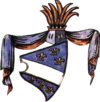|
Bosnia |

Bosnian coat
of arms,
15th century
The site dedicated to Bosnia and Bosnian issues is here.
Bos: Izuzetno mi je zadovoljstvo predstaviti digitalizovano
izdanje knjige Poviest Bosne do propasti kraljevstva, koju je 1882. napisao Vjekoslav
Klaić. Uloženi
trud i vrijeme u digitalizaciju djela iz 19. vijeka su rezultirali vrijednom
činjenicom da je knjiga sada dostupna
široj javnosti. Ovo je jedinstveno djelo koje
opisuje bosansku istoriju iz objektivne perspektive neiskrivljene predrasudama
posljednjih godina. Nadam se da će građani
BiH i drugi zainteresovani za istoriju ovih prostora biti malo upućeniji
u istoriju ove zemlje nakon čitanja ovog
vrijednog štiva. Klaić
je štampao ovu knjigu o vlastitom trošku
prije više od stotinu godina i najmanje
što ja mogu učiniti
jeste da objavim verziju u modernom formatu u sopstvenom aranžmanu
i učinim je dostupnom široj
publici u ova značajna vremena za BiH.
Knjiga je digitalno potpisana i certifikat za potvrdu autentičnosti
digitalne verzije se može preuzeti ispod.
Eng:
I have a pleasure to announce the ebook on Bosnian history - Poviest Bosne do
propasti kraljevstva, written by Vjekoslav Klaic in 1882.
It took some time and effort to digitalize the book from XIX century but was
well worth it. The book is a genuine document that describes the Bosnian history
from an objective perspective not affected by prejudice of the recent times.
Hopefully, the citizens of BiH and others interested in the history of this area
will be a bit more enlightened about this country's history after reading this
valuable writing. Klaic published this book on his own more than hundred years
ago and the least I can do is to publish the modern version of it on my own and
make it widely available to the public at these important times for Bosnia and
Herzegovina.
The book is digitally signed and you can download the certificate to confirm the
authenticity of the book below.

Download the book - Poviest Bosne do propasti kraljevstva ebook (140MB) below.
Click to download the signing certificate - Signing certificate for the book
I am also collecting books in public domain on the topic. See my shared directory with books on Bosnian history, or a related post on my blog.
The Ottoman social system fostered many undesirable habits . . . that lived on after the Empire's demise. Centuries of feudal bondage contributed to the prevalence of yavashlik, a state of being characterized by lethargy, indifference, indecision, and a tendency towards submissiveness which grew out of the necessity for survival. This can be easily detected in the attitude toward authority - apprehension but at the same time humility and acquiescence. Coupled with subservience is cleverness, expressed in attempts to get around obstacles, including those erected by authority, by using none-too-ethical . . . or even illegal means. The notion persists that it is perfectly permissible to cheat and steal from the government . . . The future being uncertain, the subjects of the Ottoman Empire developed a rather hedonistic attitude toward life and a great appreciation of leisure. Work as such is in general little prized . . . Many writers believe that fatalism (kismet), deeply rooted in Balkan Christians, is a product of Islamic influence. Fatalism derives from the doctrine of predestination, namely, that everything has been ordained by Allah or God and that no mortal can do anything to change his destiny. The Christians, like their Muslim neighbors, accepted the notion that upon everyone's forehead is written how long he will live!
Jelavich, Barbara. (1983). History of the Balkans. Cambridge: Cambridge University Press.
Wayne S. Vucinich, The Ottoman Empire: Its Record and Legacy (Princeton, N.J.: Van Nostrand, 1965), pp. 120-121.
With its 14 governments and as many parliaments, more than 150 ministers and their offices, Bosnia represents a unique example of over-institutionalisation, yet there is no positive compensation. Indeed, despite its apparent excess of institutions, Bosnia suffers from a notable absence of any institutionalised economic body that might mediate between the state and the market.
This system acts in fact as an impediment to economic, social, cultural and political progress. A system without a system, it generates growth only in the grey economy, in crime and in corruption. It creates a “free rider” culture, which holds that what needs to be done will be done by someone else.
Bosnia’s problem, therefore, is not its culture or its economy. It is the political system, which has led to the fragmentation of almost every important area of human activity. That is why those who believe the economy can reintegrate Bosnia are mistaken, since it is only a reflection of the political set-up established by Dayton.
Hadziahmetovic, Azra. Dayton “construction error” blocks Bosnia’s path to prosperity. http://www.birn.eu.com/insight_10_3_eng.php (18 Nov. 2005).

Flag of Bosnia and Herzegovina on Wikipedia.
History of Bosnia on Wikipedia ● History ● Before 1463 ● Infoplease ● Answers
Besides Klaic's book on Bosnian history here are some links to additional reading.
Wikipedia's article on Bosnian history. SFOR links to publications on Bosnia.
Noel Malcolm's Bosnian Institute web page and their list of publications related to Bosnia.
Bosnian history forum (link) contains lots of additional sources, stats, and discussion about history of the area.
Bosnian War page (link) at USA People Search, covering the conflict during 1990s. Thanks Sarah!
Have a look at Life habits post on my blog. There is a link to a research on life habits of citizens of Bosnia and Herzegovina.
Articles at Wikipedia: Bosnian language ●
iGenea analysis of the indigenous people in Bosnia and Herzegovina (link) shows the following statistics: Illyrian 40%, Teuton 20%, Celtic 15%, Slav 15%, Hunnians 6%, Thracians 4%.